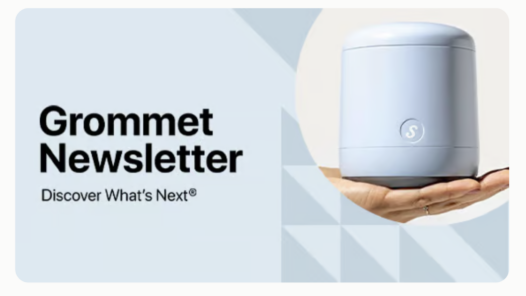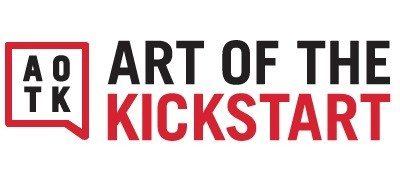Rahul Agarwal of Polygons didn’t set out to be an entrepreneur, just to reinvent what is perhaps the world’s oldest invention: the spoon. However, he’s already made more than half a million dollars with it on Kickstarter. Tune in to this episode to learn some of the keys to his success.
Polygons | The Flat 4-in-1 Measuring Spoon
Key Crowdfunding Takeaways
- How long it takes to prepare for a successful crowdfunding campaign
- How to effectively introduce stretch goals
- What to do when shipping costs are too high
- How to engage your community to make your campaign better
- How to plan for a crowdfunding campaign
Links
Connect with Polygons
Sponsors
 Art of the Kickstart is honored to be sponsored by The Gadget Flow, a product discovery platform that helps you discover, save, and buy awesome products. The Gadget Flow is the ultimate buyer’s guide for cool luxury gadgets and creative gifts. Click here to learn more and list your product – use coupon code ATOKK16 for 25% off!
Art of the Kickstart is honored to be sponsored by The Gadget Flow, a product discovery platform that helps you discover, save, and buy awesome products. The Gadget Flow is the ultimate buyer’s guide for cool luxury gadgets and creative gifts. Click here to learn more and list your product – use coupon code ATOKK16 for 25% off!
Transcript
Roy Morejon:
Welcome to Art of the Kickstart, your source for crowdfunding campaign success. I’m your host, Roy Morejon, president of Command Partners, the top full-service crowdfunding marketing agency in the world. We have helped raise over 70 million dollars for our clients since 2010. Each week I’ll interview a crowdfunding success story, an inspirational entrepreneur, or a business expert in order to help take your start-up to the next level with crowdfunding. Art of the Kickstart is honored to be sponsored by the Gadget Flow, a product-discovery platform that helps you discover, save, and buy awesome products. The Gadget Flow is the ultimate buyer’s guide for cool luxury gadgets and creative gifts. To learn more, visit thegadgetflow.com. Now, let’s get on with the show.
Welcome to another episode Art of the Kickstart. Today, I am honored to be joined by Rahul, the creator of Polygons, the flat four-in-one measuring spoon. Rahul, thank you so much for joining us today on Art of the Kickstart.
Rahul Agarwal:
Thank you for inviting me, Roy. Hello, everybody.
Roy Morejon:
Rahul, you have created an internet sensation. The Polygon’s an origami-like measuring spoon that lays flats and folds into four different sizes to fit and cook, you know, all of your cooking and baking needs. Rahul, I’ve got to ask, where does this idea start? What’s the back story on this product?
Rahul Agarwal:
I think I’ve mentioned in some articles. Some articles, I’ve mentioned this before, but I’ll go through it in good detail again. When I was just a student, back in college, I [inaudible 00:01:42] designer. I was talking to one of my seniors. I was asking, “What sorts of products should I take up to redesign, to work on?” He gave me a huge discussion. At the end of the discussion, he told me, “Whatever you do, do not take up products which have already reached the end of their evolutionary cycle. For example, a spoon.” These were his words, and I was like, “Okay, challenge accepted.” And now here we are.
Roy Morejon:
You’ve certainly met that challenge, having raised well over a half a million dollars. We’re well over 20,000 backers. This campaign is certainly the top campaign on Kickstarter right now, and everybody’s talking about it. I believe the video has now been seen over 30 million times, Rahul.
Rahul Agarwal:
Okay well, even I haven’t seen that [inaudible 00:02:33] but do link me to it.
Roy Morejon:
Certainly will. Rahul, you mentioned that this product innovation goes back to your days at school. How long have you spent preparing for this crowdfunding campaign?
Rahul Agarwal:
I will give you a bit more background about how it started. Basically, that was when the challenge started. I’ll tell you where I got the inspiration for the product from first. If you look back, really really far back when you didn’t have spoons, what did you use to actually measure and quantify stuff? You basically used your hands, right? Your palm, your hands, it’s flat. But when you want to hold something like sand or water, you cup your hands. Based on how much of a quantity of that particular sand or water, or any other thing that you want to hold, you cup it smaller or larger depending on the quantity, right? That was the basic inspiration for this product.
Roy Morejon:
It seems very simple, but absolutely, it certainly makes sense. Rahul, the campaign and the product has done really, really well. We’ve had a few hiccups in the road, but the campaign went on to get funded in the first hour and do over a hundred thousand dollars in the first day. What do you think has led to the overall success of the campaign itself?
Rahul Agarwal:
I read this quotation somewhere. I do not remember whose it was, I think it was by the founder of [inaudible 00:04:02]. “Several months and years of hard work and grind will make you seem like an overnight success.” I think that’s what happened to me is, well yeah, so after I think it got … It got to 100,000 within the span of 14 hours. Everybody around me was congratulating me, they were like, “Oh, that’s so nice how this happened all of a sudden.” But like you mentioned, there was a huge and long preparation period to perfect the product, to perfect how it looks, to perfect the message, the story which we had to tell our backers. There was a long period of grind before we launched on Kickstarter. We had to do a lot of preparation.
Roy Morejon:
Absolutely, and I’ll attest to that. Rahul’s been working with our agency Command Partners for quite some time, making sure that this campaign, overall, was not an overnight success. It’s taken months, if not years, I believe, that we’ve been working together on this.
Rahul Agarwal:
Exactly. I was just about to add that thanks to you and your team, Roy, which helped us along the way, really, really a huge [inaudible 00:05:07].
Roy Morejon:
We’ve done a good job introducing stretch goals into the campaign. Different colors, different styles if you will. How have you integrated the stretch goals into the campaign, with soliciting feedback from the community that we’ve built so far?
Rahul Agarwal:
Roy, the plan right from the start, was that we do not plan the stretch goals. We made the stretch goals based on the people’s feedback. What we’re doing right now, is we’re receiving the feedback, we’re doing some research on it that, how feasible is it? How quickly can it be done? How cost-effective is it? Then, we are introducing them as stretch goals. There’s a lot of stuff happening, regarding this, in the background, which you won’t see on the campaign right now.
For example, since we have overshot our funding goal by a huge margin, what we’re doing in the background … I’ll give you one example. I won’t promise anything, but I’ll tell you what’s happening in the background. For example, France recently had a ban on plastic cups and utensils. If you Google it, you’ll find it. What we’re trying to do is maybe get some sort of a metal coating to make it much safer and friendlier for every part of the world. To adhere to every standard possible. Those are some of the things that are going on in the background, but of course, we cannot promise that right at the moment because … Listen, until we do all the ground-work and the research, it’ll be unfair to just promise it.
Roy Morejon:
One issue that we ran into early on, Rahul, was getting feedback from the community that the shipping prices were too high. How did you end up handling this, and eventually get the cost down for the customer?
Rahul Agarwal:
The first thing that we did was we discarded the idea of the tin packaging. The whole thing started when we envisioned that the people, the backers, would get a really nice unboxing experience, with the tin packaging, but according to the feedback, which is totally, totally correct, that the tin packaging was unnecessarily adding to the bulk and the cost. They won’t be using it later anyway. It would act as a really nice gift, but after that, in the kitchen, people would never be using it. There was a little oversight from our end. That was okay, we discarded the tin packaging, and then, what we planned to do, was ship right from the source, which is from China. The combination of these factors, along with bringing in the ideal freight shipping, bulk shipping, all of this, in a consolidated manner, this brought down the shipping cost by a lot.
Roy Morejon:
Excellent. Again, it’s obviously beautiful when we can engage our community, solicit their feedback, and make positive changes to the campaign for them, so that they overall felt like they had a hand in the process of producing the product or the packaging, whatever it may have been, but also solving that issue of reducing the cost down, so we’re able to find a more cost-effective means of getting the product into their homes.
Rahul Agarwal:
Exactly.
Roy Morejon:
What advice, Rahul, would you give to someone else that’s looking to start a Kickstarter campaign, potentially, whether it be for a design project or a kitchen utensil?
Rahul Agarwal:
Work with Command Partners.
Roy Morejon:
You’re too nice. What tactical feedback would you give them?
Rahul Agarwal:
Honestly, at this point, I would say that ground-work is very, very important. Planning is very, very underrated, I would say.
Roy Morejon:
I can agree. It certainly takes a long time to get these campaigns correct, and when you launch them right, you obviously can see the success on that first day, where everybody is just eager, and overly eager in some cases, to get those early-bird rewards as well.
Rahul Agarwal:
Of course, my answer … Planning involves a whole lot of things. That’s, to me, really, really huge. It’s not possibly covered in the span of this interview, but basically just plan properly. This whole [inaudible 00:09:17] everything as in … It’s not exclusive to a Kickstarter campaign. You can’t just go in there blind, hoping to get people’s trust and excitement on something that’s not planned out, not resolved, and not solid.
Roy Morejon:
Absolutely. I know they’re excited in the background with Diwali happening right now, so we appreciate your time on this. This gets us into our launch-round, Rahul, where I rapid-fire a couple questions at you. Are you good to go?
Rahul Agarwal:
Yes, absolutely.
Roy Morejon:
What inspired you to be an entrepreneur?
Rahul Agarwal:
Roy, I wouldn’t say that I started this thing with the intent of becoming an entrepreneur. Rather, my intent was to see what [inaudible 00:10:01]. That was the intent. Now, entrepreneur is the tag that I got along the process. That’s how I would put it.
Roy Morejon:
Fair enough. If you could meet with any entrepreneur throughout history, who would you want to have a cooking lesson with?
Rahul Agarwal:
A cooking lesson? I don’t know if Elon Musk can cook, but he’s the guy.
Roy Morejon:
What would be your first question for Mr. Musk?
Rahul Agarwal:
I don’t know, how does he manage to do what he does? Here I am, grappling with a tiny little spoon, and there he is changing the whole world with whatever he does. Three huge things at a time. He’s working on Spacex, [inaudible 00:10:55].
Roy Morejon:
So he’s focused on Solar and Space, and you’re focused on spoons. I think that’s okay, Rahul. What meal would you cook for him?
Rahul Agarwal:
We have this particular thing in India called Maggi, have you heard of it?
Roy Morejon:
I have.
Rahul Agarwal:
That’s one of the few things I know how to cook really well, because it’s so simple.
Roy Morejon:
Excellent. Rahul, what’s the last book that you read?
Rahul Agarwal:
Have you read this book called, “Zero to One” by Peter Thiel?
Roy Morejon:
I have.
Rahul Agarwal:
Yeah, that’s the one.
Roy Morejon:
Great book. Rahul, where do you see yourself in five years?
Rahul Agarwal:
In five years? On everybody’s kitchen counter. Not physically, but through what I’ve made.
Roy Morejon:
I love that. Last question in the rapid-fire round, Rahul. What does the future of crowdfunding look like to you?
Rahul Agarwal:
The future of crowdfunding? I would say that crowdfunding has democratized the invention and innovation process by a huge, huge extent. What I believe is that we are already living the future with crowdfunding, thanks to platforms like Kickstarter, but in the near-future, how can it go larger, deeper, and more expansive? I would say maybe larger institutions like governments should be using it to gain feedback from the people, know where to put their resources, and I don’t know … Going beyond where it is right now. Gaining more and more-
Roy Morejon:
I agree, I think the government can certainly utilize that community concept of crowdfunding successfully to gauge and solicit interest and feedback from the small communities that they operate within. I agree, there’s definitely multiple uses for it, not just putting a product out there.
Rahul Agarwal:
Yeah.
Roy Morejon:
Rahul, you’ve been great. Please give our audience your pitch. Tell us what you’re all about, and where people should go to buy their Polygons.
Rahul Agarwal:
After 3,000 years, the humble spoon has been reinvented. If you want to get a piece of history, go onto Kickstarter, type in Polygons, and there you have it.
Roy Morejon:
Indeed. Rahul, it has been a pleasure, to not only work with you as a client but work on this campaign and have you on the podcast. Everyone, thank you again for tuning in. Make sure to visit artkick.wpengine.com for all of the show notes, the full transcript of everything we talked about today, plus links to the campaign, where you can purchase the product, as well as a coupon code for the Gadget Flow. Rahul, thank you so much for joining us on Art of the Kickstart.
Rahul Agarwal:
Thank you, Roy.
Roy Morejon:
Thanks for tuning into another episode of Art of the Kickstart, the show about building a better business, world, and life with crowdfunding. If you’ve enjoyed today’s episode, be sure to visit artkick.wpengine.com and tell us about it. There, you’ll find additional information about past episodes, and our Kickstarter Guide to Crushing It. If you loved this episode, leave us a review at artkick.wpengine.com/itunes. It helps more inventors and entrepreneurs find the show, and helps us get better guests on here to help build your business. If you need a more hands-on crowdfunding strategy, please feel free to request a quote on commandpartners.com. Thanks again for tuning in, we’ll see you soon.
Podcast: Play in new window | Download
Subscribe: Apple Podcasts | RSS




